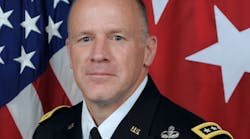The U.S. supply chain is getting much needed assistance. On May 27, the White House and the U.S. Department of Transportation announced that Retired General Stephen R. Lyons, former Commander of the U.S. Transportation Command, will be the new Port and Supply Chain Envoy to the Biden-Harris Administration Supply Chain Disruptions Task Force.
Retired General Lyons will work with the U.S. Department of Transportation (USDOT), the White House National Economic Council (NEC), ports, rail, trucking and other private companies across our supply chains to continue to address bottlenecks, speed up the movement of goods, and help lower costs.
Lyons’ experience spans 36 years of military service in positions of progressive leadership responsibility. He became the 13th commander of U.S. Transportation Command (USTRANSCOM) in 2018 USTRANSCOM’s mission is to project and sustain military power globally in order to assure our friends and allies, deter potential adversaries, and if necessary respond to win decisively. His awards include the Defense Distinguished Service Medal.
"Envoy John Porcari has done a tremendous job addressing challenges at every stage of the supply chain, and goods have moved more quickly and affordably because of his actions," said Transportation Secretary Pete Buttigieg, in a statement. "Global supply chains will remain fragile as long as the pandemic continues to disrupt ports and factories around the world, and a lot of work remains to reduce shipping delays and costs for American families. We are grateful that General Lyons, formerly commander of the U.S. Transportation Command, will now take on the role of Ports and Supply Chain Envoy, working across every level of government, labor, and industry to strengthen America's supply chains."
For the past year, the Biden-Harris Supply Chain Disruptions Task Force has been engaged in extensive outreach and engagement with the nation’s ports and private companies to address immediate supply chain bottlenecks and ultimately build a more resilient, globally competitive goods movement chain for the 21st century.
The Task Force has worked with ports to propose a container dwell fee to reduce congestion at the ports, launched a trucking action plan to recruit and retain more drivers, funded pop-up container yards to get goods from ships to shelves faster while supporting agricultural exporters, moved supply chain operators toward 24/7 operations, and launched a data sharing effort, Freight Logistics Optimization Works (FLOW), with Target, FedEx, UPS, True Value, ocean shippers, ports and additional stakeholders to reduce shipping costs and ultimately consumer costs at the store.
In the long term, the implementation of the President’s Bipartisan Infrastructure Law will finally make the investments needed in our ports, railways, highways, and other modes of transportation to improve our supply chain infrastructure. In May, USDOT announced the most annual funding from DOT’s Port Infrastructure Development Program (PIDP) in Departmental history and earlier this year announced the most funding for Marine Highways in American history.
Together, these actions are leading to progress. Long-dwelling containers at the Port of Los Angeles and Long Beach have dropped by about 50 percent since the proposed fee. The total number of container ships waiting to enter U.S. ports has dropped by nearly 50% since peaking in early February – even as containerized imports increased for most ports in March. And both the Ports of LA and Long Beach had record months in April in terms of container throughput. In addition, 2021 was the best trucking employment year since 1994. Goods are successfully being delivered to shelves and inventories excluding autos are at their highest levels in history. Further, USDOT has put out historic investments in the tens of billions to upgrade our aging infrastructure.



